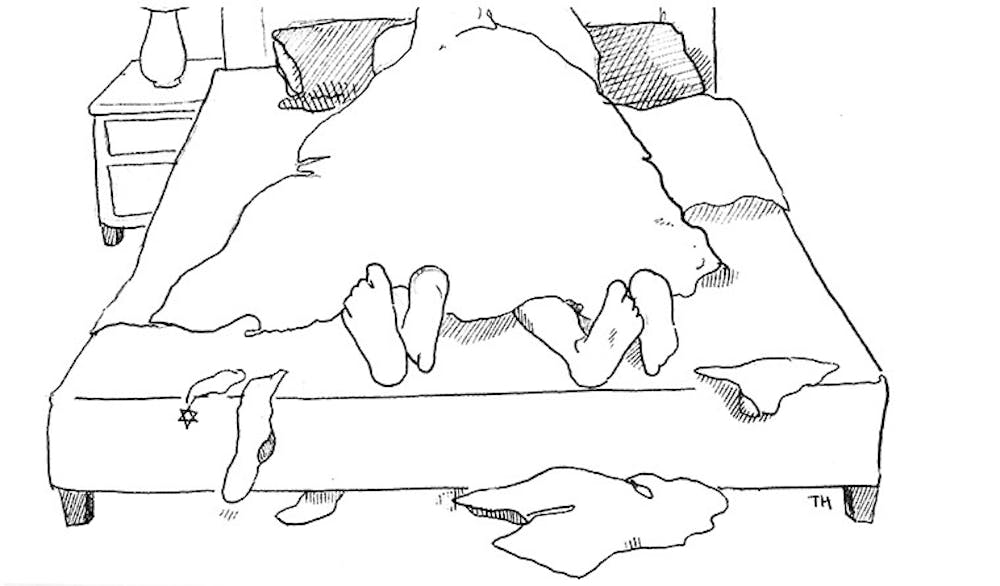In the Talmudic literature we studied at my Jewish day school, I learned that a man who desires to have extramarital sex with a woman should “die rather than she should yield.”
My culture outlaws sex, and no one asks questions about that. My parents waited until marriage and my older sisters still are virgins—and they’ve already been through college with serious boyfriends. My sisters used to joke around with me that I’m the “slut” of the family, simply because I started wearing makeup at an early age and they’re more tomboyish. To ensure that I’d laugh with them rather than cry, I became extra conscious of the way I carried myself. In effect, I knew I was not a slut and always considered their teasing to be playful, until I had sex. I had become an unmarried non–virgin, the oxymoron that everyone scorned.
Most people in the Penn community would consider me to be an innocent girl. I lost my virginity at eighteen, just before entering college, to my boyfriend of the past seven–and–a–half months. For a while, I felt ashamed of myself and thought what I’d done was horrible and wrong.
I actually had to beg the guy to have sex with me for a few hours. We were pulling an all–nighter because we knew we might never see each other again, as we were preparing to break up for long distance reasons. He kept refusing to have sex because he thought I’d regret it in the morning, but I insisted, telling him that I loved him and knew that if I did not lose my virginity to him this night, I would enter college a virgin, vulnerable to losing it to someone far less meaningful, probably under the influence of alcohol. He believed me, but I knew I had the willpower to last until marriage. I must’ve felt rebellious in the moment.
I felt guilty immediately after and promised myself I wouldn’t tell a soul, which is why I cheerfully agreed to a long bike ride with my whole family just an hour after he drove away. Biking hurt only a little, but not being able to tell my best friends about this monumental night hurt a lot. They would’ve been thrilled and relieved for me; they would’ve welcomed me into their clan they thought I wouldn’t qualify for until marriage. I didn’t want to tell them, though, because speaking the truth aloud would mean admitting it to myself.
Two weeks later at my annual physical exam, I refused to look my doctor in the eye as she asked me, “Are you sexually active?” She’d been my family’s doctor since I was seven. After she had to repeat herself several times, I screamed, “YES, OK?!”
Now that someone else knew, I forced myself to come to terms with reality. Growing up, I’d always assumed I’d wait until marriage. This wasn't a topic I discussed with my parents, but rather, it was an implicit rule stemming from my religious background. At one point, the girls at my school, whom I spent most weekends with, followed this rule but made concessions whenever they wanted to hook up with boys while avoiding sex; accordingly, they were referred to as “The Blowjob Brigade.”
I didn't understand this logic. The purpose of abstinence, from a religious perspective, is to protect women from being mistreated and undervalued as prospective wives. In the olden days, women avoided any relationship with men until they were ready to wed. However, in modern society, women get married later and start interacting with boys earlier. If sex is supposed to be mutually beneficial—and blowjobs, by definition, are not—being a part of this brigade while abstaining from sex seemed counterintuitive. Especially since the favor was not being returned by these high school boys.
In spite of acknowledging this hypocrisy, I did participate in the brigade every now and then, whenever I wanted intimacy with a boy I liked or felt bad about giving him blue balls. I couldn’t get it out of my head that actual sex was wrong. I couldn’t stop feeling bad about it after I’d done it.
Even once I got to college, the only person to know about my supposed transgression was my doctor. Then, second semester came around and I joined a sorority, befriending lots of girls with upbringings different from mine. In an intense game of never–have–I–ever, these girls revealed many scandalous stories, way above my head. No one even thought to say, “Never have I ever had sex,” figuring that wouldn’t get any fingers down. During this game, I made a decision to myself: if any of these girls asked me about sex, I wouldn’t lie.
In retrospect, I realize my decision to lose my virginity that night was logical. I don’t need to hold myself accountable to certain customs I consider antiquated and unreasonable for me in modern society. Although my instincts told me to wait until marriage, it was important for me to acknowledge that simply hearing something over and over again throughout childhood does not make it right. My takeaway from this religious custom is that sex, which I believe does include blowjobs, should be meaningful and only done with someone who makes you feel safe and special. Religious attitudes suggest that sex should involve not only the body, but also the heart and the mind.
Now that I’ve analyzed this tradition rather than blindly accepting it, I no longer feel guilty—I am not rebellious, I simply do what I want when it truly feels right.







